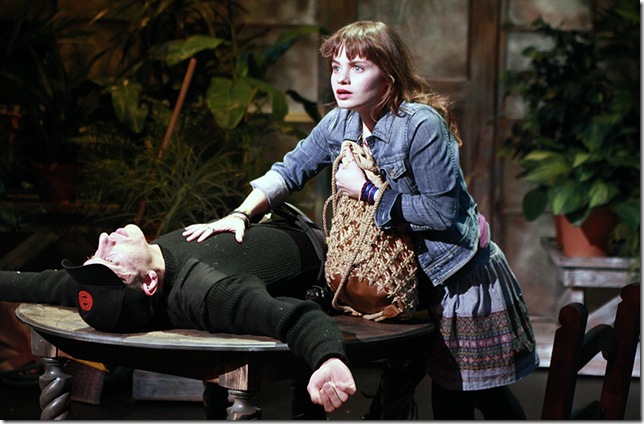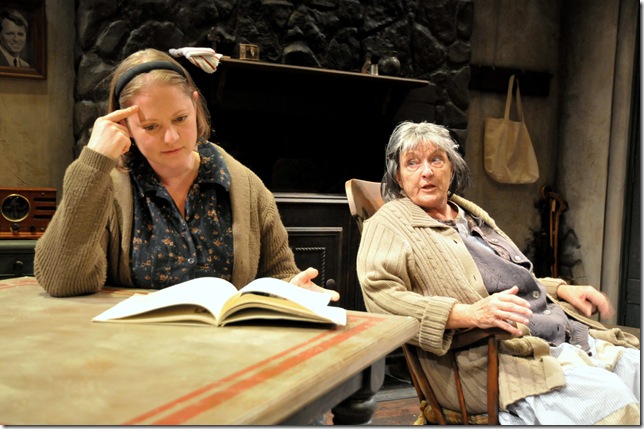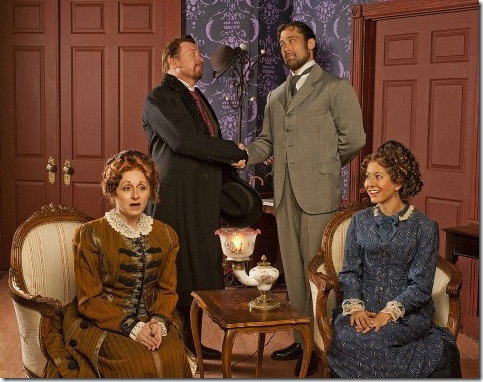Whether or not the pen is truly mightier than the sword, playwright Carter W. Lewis is out to prove in his enigmatically titled The Cha-Cha of a Camel Spider that slam poetry can trump a mercenary private army.
If that sounds like an unlikely match-up, then you are grasping the surreal quality of this darkly comic tale, which seems headed towards a rant against the Blackwaters of the world, then takes a distinct left turn to demonstrate the transporting power of art.
Instead of political discourse, Lewis turns out to be interested in matters of the heart, even if the most prominent heart in the play happens to be artificial. Confused yet? Oh, just head to Florida Stage, buckle your seat belt and go along for the ride.
The theatrical odyssey begins in the headquarters offices of “e,” a corporate army training facility. There Loretta Harahan (Laura Turnbull) and her daughter Bethany (Elizabeth Birkenmeier) have broken in and hacked into the company’s computers, hoping to gain the death benefits they are owed for Loretta’s husband, a high-ranking “e” officer killed by “friendly fire” from his own operatives.
Stack and Denny (Todd Allen Durkin and Eric Mendenhall), the hit men who did in Hanrahan in Kandahar, Afghanistan, have since been demoted to stateside security guards. Between grousing jags, they catch Bethany and abduct her to a greenhouse — impressively realized by scenic designer Victor A. Becker — that is rapidly gong to seed.
There, Bethany attracts yet another intriguing character, a wisecracking Muslim cab driver named Ahmad Ahmadazai — a moniker guaranteed to be mangled — who may actually be dead. (Don’t ask, just go with it.) As played with sly comic timing by Antonio Amadeo, the character and the performer all but steal the show.
There is more to the plot, but much of it should remain a surprise, as Lewis leads us a few cha-cha steps away from reality. Clarity is not the strength of the play’s resolution, but then you get the feeling that clarity was never intended. What is clear in the poetic resolution is that Birkenmeier pulls off a poetic performance art tour de force, which is best enjoyed when detached from any effort to ascribe meaning to it.
Over the past two decades, Florida Stage has produced a handful of Lewis’s works, all comedies, that have grown darker and increasingly more lyrical. As The Cha-Cha of a Camel Spider demonstrates, he has not lost his ability to surprise or entertain us.
THE CHA-CHA OF A CAMEL SPIDER, Florida Stage, Kravis Center’s Rinker Playhouse, 701 Okeechobee Blvd., West Palm Beach. Through Sunday, June 5. Tickets: $25-50. Call: (561) 585-3433 or (800) 514-3837.
* * *
Forty-ish, plain-looking Maureen Folan is no pageant contestant and the Irish village of Leenane is no winner among places to live. Still, you will want to spend a couple of hours at Palm Beach Dramaworks’ heartbreaking and perversely comic production of The Beauty Queen of Leenane.
It comes from the warped, yet amusing mind of Martin McDonagh, who has churned out numerous grisly tales of life in coastal Connemara, County Galway. Beauty Queen was his first work to reach Broadway, in 1998, and is a good entry port into his world.
Poor, put-upon Maureen, a spinster with no prospects of romance, has devoted her life to attending the needs of her sour, manipulative mother, Mag, out of some misplaced sense of duty. They spend each day barking at one another, rocking-chair-bound Mag demanding her porridge or tea or other sustenance, pushing Maureen’s emotional buttons, and exasperated, weary Maureen pushing right back.
Maureen sees no way out of her predicament, until a distant acquaintance, Pato Dooley, returns briefly to Leenane from his home in London. Maureen not only reconnects with him at a party, she brings him back to her ramshackle house and takes him into her bed. Mag quickly perceives Pato as a threat to her status quo and she is correct, for he later writes Maureen, telling her about a job offer he has in Boston and inviting her to join him there.
Pato unwisely entrusts his not-too-bright brother Ray to deliver the letter into Maureen’s hands. Typical of McDonagh’s mordant humor is the scene where Ray arrives with the letter, impatiently considers leaving it with Mag, whose eyes dart around the room, feverishly eager to get her hands on the missive, suspicious of its contents and determined to intercept it.
The stakes keep increasing as Maureen and Mag turn their mental tug-of-war into a game that turns violent. With devilish skill, McDonagh plays with the audience, transferring our sympathies between the two women, as we begin to see how alike they really are.
Rugged Kevin Kelly lends worthy support as Pato, particularly when reciting his letter to Maureen, and Blake DeLong is even better as gregarious Ray. Still, the play belongs to the two women and director William Hayes gets a couple of stellar performances from a couple of actresses familiar to Dramaworks’ audiences.
Barbara Bradshaw (The Gin Game, The Chairs) turns her natural likeability inside out as Mag, a mother worth hating. Yet the actress delves deeper with the character and almost has up caring about the vindictive old biddy. Kati Brazda, so impressive as Josie Hogan in A Moon for the Misbegotten, plays a similar love-starved, no-longer-young woman here, with deceptive complexity.
For the final production at Dramaworks current cramped quarters, resident scenic designer Michael Amico again turns the space to his advantage, creating a drab, grimy, claustrophobic cottage, lit lugubriously by Ron Burns.
Palm Beach Dramaworks leans decidedly towards, well, dramas, with its stated mission of “theater to think about.” But with The Beauty Queen of Leenane, Hayes and company show that one need not stop thinking — and feeling — at a well-written, expertly performed comedy.
THE BEAUTY QUEEN OF LEENANE, Palm Beach Dramaworks, 322 Banyan Blvd., West Palm Beach. Through June 19. Tickets: $47. Call: (561) 514-4042.
* * *
The applications of that marvelous discovery we call electricity have afforded civilization many modern conveniences, but none more revolutionary than the vibrator. That is the tongue-in-cheek view of playwright Sarah Ruhl, who explores the sexual awakening of Victorian society thanks to a little stimulation “down there,” in her Tony-nominated In the Next Room, or The Vibrator Play.
This amusing one-joke comedy, overstretched to a two-act play, considers the medical breakthrough of a Dr. Givings (a charmingly solicitous Jim Ballard), who has built up a tidy practice in upstate New York treating women for the catch-all complaint known as “hysteria.”
You see, he has a marvelous wooden box with knobs and dials, attached to a humming handset which he applies with care to his patients’, um, female nether parts. The result is an abrupt contraction that Givings calls a “paroxysm.” His patients have no idea what to call it; they just know they are eager to sign up for daily treatments.
Typical of the doctor’s clientele is Sabrina Daldry (Irene Adjan), who arrives with her perplexed, chauvinistic husband (Stephen G. Anthony) and is whisked into “the next room” — Givings’ examination lab — to get the vibrator special. The same goes for an effete artist named Leo Irving (Ricky Waugh), suffering from a similar malady. He is given the same treatment, though with a long cylindrical attachment to the handset, applied to his anus, if you get the picture.
Dr. Givings is so concerned for his patients, yet oblivious to the agitated unhappiness of his wife Catherine (Julie Kleiner), a new mother producing insufficient milk to nurse her baby. So she hires the Daldrys’ housekeeper (Renata Eastlick), who recently lost her own baby, as a wet nurse and quickly becomes resentful that her child takes so readily to the nurse.
Ruhl’s view of these Victorians is rather cartoonish and condescending. The women know nothing about sex, even as they keep popping out babies, and the men are content to keep them ignorant. Virtually every character misreads romantic signals and acts erratically on impulse, but oh, that vibrator machine, it is a marvel.
Ruhl, whose Dead Man’s Cell Phone and The Clean House have also been produced locally, knows how to create provocative situations, but then usually seems at a loss for a justifying point of view. Nevertheless, she is a critics’ darling and The Vibrator Play was a Pulitzer Prize finalist. At GableStage, Joe Adler does what he can to breathe life into the script and, despite this world of corsets and complex undergarments, he manages to find an opportunity for some nudity.
IN THE NEXT ROOM, or THE VIBRATOR PLAY, GableStage at the Biltmore Hotel, 1200 Anastasia Avenue, Coral Gables. Through June 12. Tickets: $37.50-$47.50. Call; (305) 445-1119.


